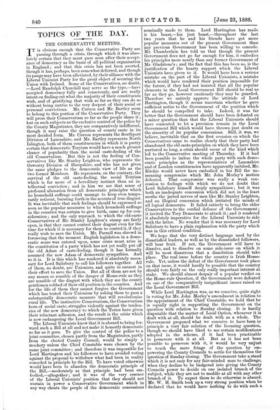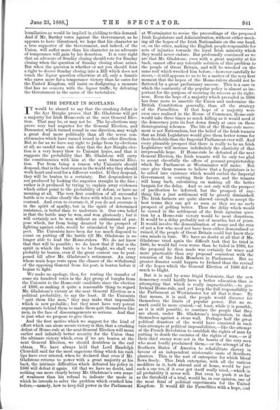TOPICS OF THE DAY.
THE CONSERVATIVE MEETING.
The Liberal Unionists know that it is absurd to bring for- ward such a Bill at all and not make it honestly democratic so far as it goes. To give the control of the police to a joint committee, chosen partly from the Magistrates, partly from the elected County Council, would be simply a mockery unless the Chief Constable were chosen by the same pint committee ; and therefore it was impossible for Lord Hartington and his followers to have avoided voting against the proposal to withdraw what had been in reality conceded in principle by the Bill. To have voted otherwise would have been to abandon the democratic principle of the Bill,—moderately as that principle had been em- bodied,—altogether ; and it was of the very essence of the Liberal Unionists' position that they should not sustain in power a Conservative Government which in any way cheats the people of the democratic concessions nominally made to them. Lord Hartington has made it his boast,—his just boast,—throughout the last two years that he and his friends have got more popular measures out of the present Government than any previous Government has been willing to concede. Mr. Chamberlain has told us that though the present Government does not go far enough for him, it embodies his principles more nearly than any former Government of Mr. Gladstone's ; and the fact that this has been so, is the' justification of the hearty support which the Liberal Unionists have given to it. It would have been a serious mistake on the part of the Liberal Unionists, a mistake which would have rendered their position impossible for the future, if they had not insisted that all the popular elements in the Local Government Bill should be real so far as they go, however cautiously they may be guarded. Therefore we entirely approve the attitude of Lord Hartington, though it seems uncertain whether he gave sufficient notice to the Government of the position which he should be compelled to take. Indeed, it was far better that the Government should have been defeated on a minor question than that the Liberal Unionists should have consented to let a provision remain in the Local Government Bill which would have thrown just doubt on the sincerity of its popular concessions. Still, it was, we believe, inevitable that on the first occasion on which the Conservatives came to realise clearly that their party had abandoned the old caste-principles on which they have been nurtured so long, a crisis should occur of the kind which led to the Conservative meeting of Thursday. If it had been possible to imbue the whole party with such demo- cratic principles as the representatives of Lancashire and of London constituencies have apparently imbibed, Mr. Ritchie would never have embodied in his Bill the un- meaning compromise which Mr. John Morley's motion defeated. That compromise was really a weak con- cession to feelings with which we do not doubt that Lord Salisbury himself deeply sympathises ; but it was both an inadequate concession which did not in the least soothe the jarred nerves of men like Mr. Stanley Leighton, and an illogical concession which irritated the minds of all logical democrats. It failed entirely to bring the older Conservatives to the cordial defence of the Government ; it invited the Tory Democrats to attack it ; and it rendered it absolutely imperative for the Liberal Unionists to side with the latter. No wonder that it was necessary for Lord Salisbury to have a plain explanation with the party which was in this critical condition.
We hope that the very distinct language used by the dissatisfied leaders, as well as by the dissatisfied followers, will bear fruit. If not, the Government will have to dissolve, and to dissolve on some side-issue on which it will be most disastrous that a dissolution should take place. The real issue before the country is Irish Home- rule. Yet, unless the defeat of the Government took place on that issue, it would hardly be possible that the country should vote fairly on the only really important interest at stake. We should almost despair of a popular verdict on the Home-rule Question, if the Government were defeated on one of the comparatively insignificant issues raised on the Local Government Bill.
While Lord Hartington was, as we conceive, quite right in voting for Mr. John Morley's amendment in relation to the appointment of the Chief Constable, we hold that he is equally right in supporting the Government on the question with relation to Sunday closing. It is hardly disputable that the matter of Local Option, whenever it is dealt with at all, should be dealt with as a whole. The Government proposed what we conceive to have been in principle a very fair solution of the licensing question, though we should have liked to see certain modifications adopted in the scheme, if it had been practicable to persevere with it at all. But as it has not been possible to persevere with it, it would be very unjust to touch the mere fringe of the question by em- powering the County Councils to settle for themselves the question of Sunday closing. The Government take a stand which it is not easy for any fair-minded man to challenge, when they decline to be badgered into giving the County Councils power to decide on one isolated branch of the subject, while they are not to meddle at all with any other branch of it. To expect them to do otherwise is absurd. Mr. W. H. Smith took up a very strong position when he declared that he would have nothing to do with such a humiliation as would be implied in yielding to this demand. And if Mr. Bartley votes against the Government, as he appears to have threatened, we hope that his character as a true supporter of the Government, and indeed, of the Union, will suffer more than his character as an advocate of temperance will gain by his desertion. it is very right that an advocate of Sunday closing should vote for Sunday closing when the question of Sunday closing alone arises. But when the question is whether or not you should foist a right to decree Sunday closing into a Bill which does not touch the liquor question otherwise at all, only a fanatic who cares more for a temperance victory than he cares for the United Kingdom, will insist on disfiguring a measure that has no concern with the liquor traffic, by defeating the Government in the cause of the teetotalers.







































 Previous page
Previous page